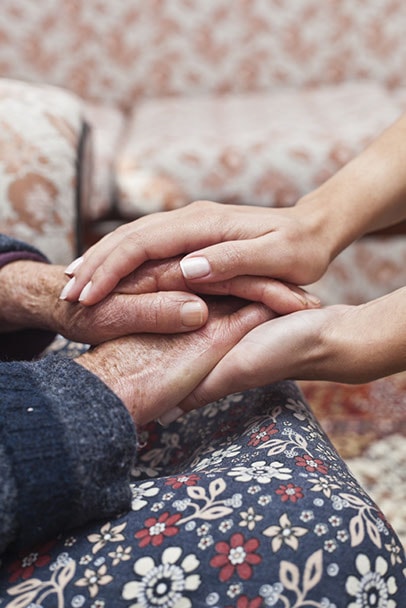
When you’re suddenly faced with finding senior care for a loved one, you’ll encounter a vast and unfamiliar number of care types and options. Most people quickly learn and understand the differences between care types, but find the complexity of selecting appropriate care overwhelming.
How do you know which level of care your loved one needs? The answer depends upon how much assistance with “Activities of Daily Living” also known as ADLs, your loved one requires. These are the day-to-day activities we do to sustain ourselves, such as eating, bathing, toileting, dressing, and grooming.
We’ve compiled a list of common care types you may encounter:
Senior Apartments/55+ Apartments
Also, referred to as 55+ apartments, age restricted apartments, senior condos, 55+ condos, cottages and adult communities. Senior apartments are just like apartments for people of all ages, but they have an age restriction; typically, resident must be older than 55 or 62. Older adults often feel more secure in senior apartments, and prefer living near people from their own generation.
Independent Living/ Retirement Communities
Independent living communities are also known as retirement homes or senior housing. They usually provide dining services and light housekeeping, but do not offer personal care services. However, outside home care providers can be hired to assist with ADLs.
Assisted Living
Assisted living housing is a long term senior care option that provides services such as meals, medication management, bathing, dressing and transportation, but typically not the 24-hour medical care found at skilled nursing homes. Assisted living communities tend to offer high quality restaurant style dining, outings, and social activities such as gardening, cooking, writing and art classes, exercise programs, book clubs and more.
Residential Care Home/Board and Care
Care homes are ordinary homes in residential neighborhoods that have been adapted to care for a small group of residents. Offering services similar to assisted living communities, care homes specialize in providing personalized care in a home-like environment.
Memory Care/ Alzheimer’s Care
Memory care is specialized, secured care for people who have Alzheimer’s disease or another type of dementia. Residents live in a safe, secure environment designed to maximize their strengths and minimize their limitations. The staff at memory care communities have extra training in dementia care giving.
Nursing Homes/Skilled Nursing Facilities
Nursing homes, also called skilled nursing facilities, are for seniors who require the highest level of 24-hour care, including those who are bedridden. Nursing homes are also used by seniors for rehabilitation following a hospitalization. A Place for Mom is prohibited by applicable federal laws from referring to these communities, as most are for Medicaid or public pay recipients.
Respite Care/Short-Term Stay
Respite care typically refers to a short-term stay at a long-term community. Respite care can also refer to in-home care giving services used for only a short period. Family caregivers use respite services when they need a break of have other obligations.
Home Care
Home care services are provided by a visiting aid. Home care aids typically provide non-medical assistance with ADLs.
Adult Day Care/Adult Day Services
Adult day care is a safe place for seniors who require assistance with activities of daily living during the day, and return to their own home in the afternoon or evening. Adult day services prepare meals and sponsor various recreational activities. Many adult day centers specialize in providing care for seniors with Alzheimer’s or other types of dementia.
Senior Apartments/ 55+ Apartments
Who is it for?: Active, independent and healthy seniors who are enjoying their retirement years.
Services may include: None
Typical range: $400-$2,000 per month
Independent Living/ Retirement Communities
Who is it for?: Active, independent and healthy seniors who wish to live with other seniors in a community setting.
Services may include: Golf course, swimming pool, social activities, gourmet dining services and light housekeeping.
Typical range: $1,250-$4,000 per month
Assisted Living
Who is it for?: Seniors who are independent and social, but need assistance with ADLs
Services may include: Fitness classes, social activities, healthy dining, transportation, assistance with ADLs, housekeeping
Typical Range: $2,500-$6,000 per month
Who is it for?: Seniors who are independent and social, but need assistance with ADLs and prefer a smaller home-like environment.
Services may include: Social activities, meals, transportation, assistance with ADLs, housekeeping
Typical range: $1,750-$6,000 per month
Who is it for?: Seniors who have Alzheimer’s disease or other types of dementia.
Services may include: Special meal preparation, secured environment and specialized memory support.
Typical range: $3,500- $8,000 per month
Who is it for?: Seniors who require 24-hour medical care
Services may include: Provides the highest level of care to patients who need 24/7 medical attention.
Typical range: $3,500-$8,00 per month
Who is it for?: Seniors who live at home and need help with meal preparation, ADLs, transportation
Services may include: Meals, assistance with ADLs, and housekeeping
Typical range: $15-$30 per hour
Adult Day Care/ Adult Day Services
Who is it for?: Seniors who need assistance, socialization and meals during work hours
Services may include: Meals, assistance with ADLs, and housekeeping
Typical range: $40-$90 per day